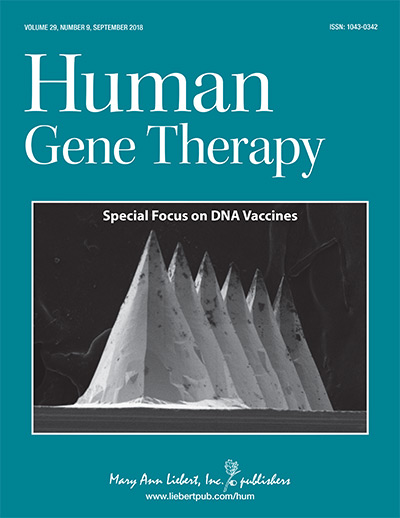For Immediate Release
Advantages of DNA Immunization Platform for Eliciting Monoclonal Antibodies in Multiple Species
Contact: Kathryn Ryan
914-740-2250
kryan@liebertpub.com

New Rochelle, NY, October 19, 2018—Researchers have taken advantage of the benefits of DNA immunization over traditional protein-based immunization to elicit monoclonal antibodies (mAbs) against challenging targets in three species – mouse, rabbit, and human models. They describe their use of DNA immunization as a new mAb development platform in an article published in a Special Issue on DNA Vaccines in Human Gene Therapy, a peer-reviewed journal from Mary Ann Liebert, Inc., publishers. Click here to read the full-text article free on the Human Gene Therapy website through November 19, 2018.
Shuying Liu, SYL Consulting, Thousand Oaks, CA and Shixia Wang and Shan Lu, University of Massachusetts Medical School, Worcester, MA coauthored the article entitled “Using DNA Immunization to Elicit Monoclonal Antibodies in Mice, Rabbits, and Humans.” Shan Lu was Guest Editor of the Special Issue.
The researchers described the multiple advantages of DNA immunization, including the ability to stimulate both innate and adaptive immunity to elicit high levels of antigen-specific antibody responses, to activate multiple pathways of innate immunity, and together with T cells to lead to the development of antigen-specific B cells that can generate high affinity antibody responses.
“The innovative approach described by this team demonstrates the great flexibility and utility of DNA vaccines in the creation of monoclonal antibodies,” says Editor-in-Chief Terence R. Flotte, MD, Celia and Isaac Haidak Professor of Medical Education and Dean, Provost, and Executive Deputy Chancellor, University of Massachusetts Medical School, Worcester, MA. “In this context, it represents a particularly precise approach to precision medicine.”
Research reported in this publication was supported by the National Institutes of Health under Award Numbers U19AI082676, P01AI082274, and 5R21/R33AI087191. The content is solely the responsibility of the authors and does not necessarily represent the official views of the National Institutes of Health.
About the Journal
Human Gene Therapy, the Official Journal of the European Society of Gene and Cell Therapy, British Society for Gene and Cell Therapy, French Society of Cell and Gene Therapy, German Society of Gene Therapy, and five other gene therapy societies, is an authoritative peer-reviewed journal published monthly in print and online. Led by Editor-in-Chief Terence R. Flotte, MD, Celia and Isaac Haidak Professor of Medical Education and Dean, Provost, and Executive Deputy Chancellor, University of Massachusetts Medical School, Human Gene Therapy presents reports on the transfer and expression of genes in mammals, including humans. Related topics include improvements in vector development, delivery systems, and animal models, particularly in the areas of cancer, heart disease, viral disease, genetic disease, and neurological disease, as well as ethical, legal, and regulatory issues related to the gene transfer in humans. Its companion journals, Human Gene Therapy Methods, published bimonthly and focused on the application of gene therapy to product testing and development, and Human Gene Therapy Clinical Development, published quarterly, features data relevant to the regulatory review and commercial development of cell and gene therapy products. Tables of contents for all three publications and a free sample issue may be viewed on the Human Gene Therapy website.
About the Publisher
Mary Ann Liebert, Inc., publishers is a privately held, fully integrated media company known for establishing authoritative peer-reviewed journals in many promising areas of science and biomedical research, including Nucleic Acid Therapeutics, Tissue Engineering, Stem Cells and Development, and Cellular Reprogramming. Its biotechnology trade magazine, GEN (Genetic Engineering & Biotechnology News), was the first in its field and is today the industry’s most widely read publication worldwide. A complete list of the firm’s 80 journals, books, and newsmagazines is available on the Mary Ann Liebert, Inc., publishers website.